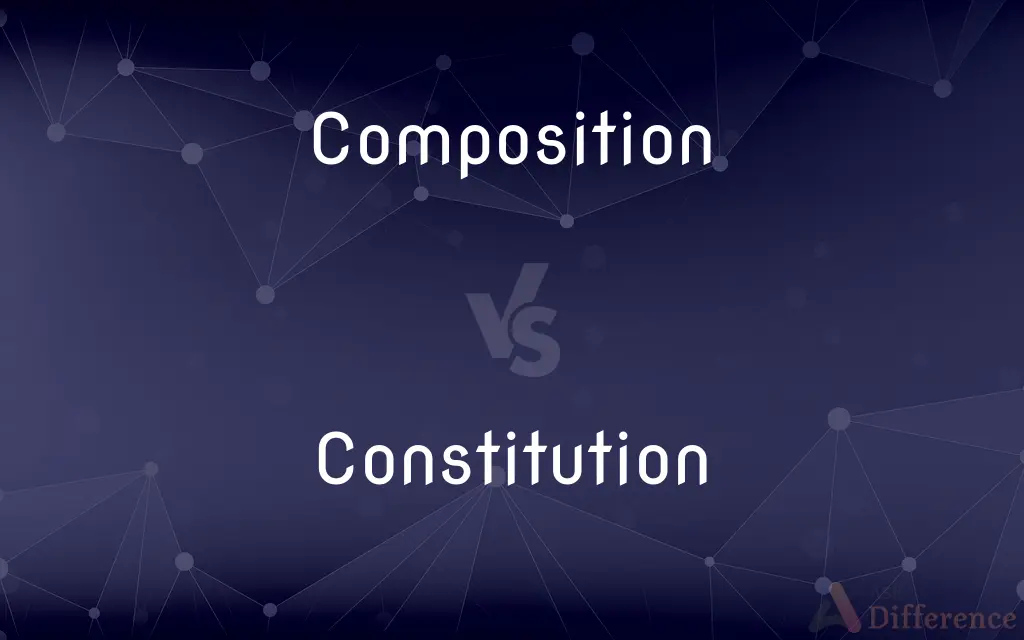Composition vs. Constitution — What's the Difference?
Edited by Tayyaba Rehman — By Maham Liaqat — Updated on March 26, 2024
Composition focuses on the arrangement or makeup of elements within a structure, while Constitution refers to the physical makeup or structure itself, often in a legal or organizational context.

Difference Between Composition and Constitution
Table of Contents
ADVERTISEMENT
Key Differences
Composition involves the way in which components or elements are combined and arranged, determining the overall structure and function. It is crucial in various fields such as chemistry, where it refers to the chemical makeup of compounds, and in art, where it pertains to the arrangement of visual elements. On the other hand, Constitution generally denotes the fundamental principles or established precedents according to which a state or other organization is governed. In biology, it can refer to the physical makeup of an individual, highlighting differences in innate physical and functional characteristics.
In the context of writing and literature, composition refers to the creation and structuring of written material, focusing on how ideas, narratives, and language are arranged to convey meaning effectively. Whereas, the constitution in a legal framework involves the creation and application of governing laws and principles that define the operation and governance of a state or organization, underscoring the establishment of legal and procedural frameworks.
When discussing materials or substances, composition details the specific elements or compounds that constitute the material, emphasizing the variety and proportion of these components. Constitution, in a more general sense, can refer to the overall makeup or character of something, often highlighting the arrangement and interaction of parts within a whole rather than the specifics of component makeup.
In musical contexts, composition refers to the process of creating music, including the arrangement of melodies, harmonies, rhythms, and textures to create a cohesive piece. Constitution, by contrast, does not have a direct application in music but could metaphorically relate to the foundational principles or the inherent qualities that define the character or identity of a musical genre or tradition.
Composition is often dynamic, highlighting the process and methodology behind the arrangement of elements within a system or work, focusing on the creative, strategic, or functional aspects of assembly. Constitution, meanwhile, suggests a more static concept, emphasizing the established structure or set of rules that govern an entity or system, often reflecting the foundational or inherent characteristics that determine its nature and function.
ADVERTISEMENT
Comparison Chart
Definition
The arrangement or combination of elements or parts.
The physical makeup or the set of basic principles governing an entity.
Contexts of Use
Art, music, literature, chemistry.
Law, biology, organizational structure.
Focus
How elements are arranged and interact.
The inherent structure or governing principles.
Nature
Dynamic, focusing on the process of combining elements.
More static, emphasizing established structures or principles.
Examples
Chemical composition, musical composition.
Constitutional law, physical constitution of an individual.
Compare with Definitions
Composition
The act and process of creating written content.
His composition skills were evident in his compelling essays.
Constitution
The nature or character of something.
The constitution of the material makes it extremely durable.
Composition
The arrangement or combination of various elements within a work or substance.
The composition of the painting included both realistic and abstract elements.
Constitution
A document outlining the fundamental political principles of a state.
The constitution of the newly formed country was drafted to ensure democracy.
Composition
The overall makeup of something.
The composition of the committee was diverse, including members from various departments.
Constitution
The body of fundamental principles or established precedents according to which a state or other organization is acknowledged to be governed.
The U.S. Constitution establishes the framework of the federal government.
Composition
The specific elements and their quantities in a compound.
The composition of water is two hydrogen atoms for every oxygen atom.
Constitution
The physical makeup of an individual, especially regarding health and strength.
His robust constitution allowed him to recover quickly from the illness.
Composition
The creation and arrangement of musical elements in a piece.
Her latest composition received acclaim for its innovative use of harmony.
Constitution
The regulations governing an organization.
The club’s constitution specifies the requirements for membership.
Composition
The combining of distinct parts or elements to form a whole.
Constitution
A constitution is an aggregate of fundamental principles or established precedents that constitute the legal basis of a polity, organisation or other type of entity and commonly determine how that entity is to be governed.When these principles are written down into a single document or set of legal documents, those documents may be said to embody a written constitution; if they are encompassed in a single comprehensive document, it is said to embody a codified constitution. The Constitution of the United Kingdom is a notable example of an uncodified constitution; it is instead written in numerous fundamental Acts of a legislature, court cases or treaties.Constitutions concern different levels of organizations, from sovereign countries to companies and unincorporated associations.
Composition
The manner in which such parts are combined or related.
Constitution
The act or process of composing, setting up, or establishing.
Composition
General makeup
The changing composition of the electorate.
Constitution
The composition or structure of something; makeup.
Composition
The result or product of composing; a mixture or compound.
Constitution
The physical makeup of a person
Having a strong constitution, she had no trouble climbing the mountain.
Composition
Arrangement of artistic parts so as to form a unified whole.
Constitution
The system of fundamental laws and principles that prescribes the nature, functions, and limits of a government or another institution.
Composition
The art or act of composing a musical or literary work.
Constitution
The document in which such a system is recorded.
Composition
A work of music, literature, or art, or its structure or organization.
Constitution
Constitution The supreme law of the United States, consisting of the document ratified by the original thirteen states (1787-1790) and subsequent amendments.
Composition
A short essay, especially one written as an academic exercise.
Constitution
The act, or process of setting something up, or establishing something; the composition or structure of such a thing; its makeup.
Composition
(Law) A settlement whereby the creditors of a debtor about to enter bankruptcy agree, in return for some financial consideration, usually proffered immediately, to the discharge of their respective claims on receipt of payment which is in a lesser amount than that actually owed on the claim.
Constitution
(government) The formal or informal system of primary principles and laws that regulates a government or other institutions.
Composition
(Linguistics) The formation of compounds from separate words.
Constitution
(law) A legal document describing such a formal system.
Composition
(Printing) Typesetting.
Constitution
(Catholicism) A document issued by a religious authority serving to promulgate some particular church laws or doctrines.
Composition
The act of putting together; assembly.
Constitution
A person's physical makeup or temperament, especially in respect of robustness.
He has a strong constitution, so he should make a quick recovery from the illness.
Composition
A mixture or compound; the result of composing.
Constitution
(dated) The general health of a person.
Composition
The proportion of different parts to make a whole.
Constitution
The act or process of constituting; the action of enacting, establishing, or appointing; enactment; establishment; formation.
Composition
The general makeup of a thing or person.
Constitution
The state of being; that form of being, or structure and connection of parts, which constitutes and characterizes a system or body; natural condition; structure; texture; conformation.
The physical constitution of the sun.
Composition
(obsolete) An agreement or treaty used to settle differences; later especially, an agreement to stop hostilities; a truce.
Constitution
The aggregate of all one's inherited physical qualities; the aggregate of the vital powers of an individual, with reference to ability to endure hardship, resist disease, etc.; as, a robust constitution.
Our constitutions have never been enfeebled by the vices or luxuries of the old world.
Composition
(obsolete) A payment of money in order to clear a liability or obligation; a settling or fine.
Constitution
The aggregate of mental qualities; temperament.
He defended himself with . . . less passion than was expected from his constitution.
Composition
A payment of fine in order to settle a (usually minor) criminal charge.
Constitution
The fundamental, organic law or principles of government of men, embodied in written documents, or implied in the institutions and usages of the country or society; also, a written instrument embodying such organic law, and laying down fundamental rules and principles for the conduct of affairs.
Our constitution had begun to exist in times when statesmen were not much accustomed to frame exact definitions.
Composition
(legal) an agreement or compromise by which a creditor or group of creditors accepts partial payment from a debtor.
Constitution
An authoritative ordinance, regulation or enactment; especially, one made by a Roman emperor, or one affecting ecclesiastical doctrine or discipline; as, the constitutions of Justinian.
The positive constitutions of our own churches.
A constitution of Valentinian addressed to Olybrius, then prefect of Rome, for the regulation of the conduct of advocates.
Composition
An essay.
Constitution
Law determining the fundamental political principles of a government
Composition
(linguistics) The formation of compound words from separate words.
Constitution
The act of forming something;
The constitution of a PTA group last year
It was the establishment of his reputation
He still remembers the organization of the club
Composition
A work of music, literature or art.
Constitution
The way in which someone or something is composed
Composition
(printing) Typesetting.
Constitution
United States 44-gun frigate that was one of the first three naval ships built by the United States; it won brilliant victories over British frigates during the War of 1812 and is without doubt the most famous ship in the history of the United States Navy; it has been rebuilt and is anchored in the Charlestown Navy Yard in Boston
Composition
(mathematics) Applying a function to the result of another.
Composition
(physics) The compounding of two velocities or forces into a single equivalent velocity or force.
Composition
(obsolete) Consistency; accord; congruity.
Composition
Synthesis as opposed to analysis.
Composition
The arrangement and flow of elements in a picture.
Composition
(object-oriented programming) Way to combine simple objects or data types into more complex ones.
Composition
The act or art of composing, or forming a whole or integral, by placing together and uniting different things, parts, or ingredients.
Composition
The state of being put together or composed; conjunction; combination; adjustment.
View them in composition with other things.
The elementary composition of bodies.
Composition
A mass or body formed by combining two or more substances; as, a chemical composition.
A composition that looks . . . like marble.
Composition
A literary, musical, or artistic production, especially one showing study and care in arrangement; - often used of an elementary essay or translation done as an educational exercise.
Composition
Consistency; accord; congruity.
There is no composition in these newsThat gives them credit.
Composition
Mutual agreement to terms or conditions for the settlement of a difference or controversy; also, the terms or conditions of settlement; agreement.
Thus we are agreed:I crave our composition may be written.
Composition
The adjustment of a debt, or avoidance of an obligation, by some form of compensation agreed on between the parties; also, the sum or amount of compensation agreed upon in the adjustment.
Compositions for not taking the order of knighthood.
Cleared by composition with their creditors.
Composition
Synthesis as opposed to analysis.
The investigation of difficult things by the method of analysis ought ever to precede the method of composition.
Composition
A mixture of ingredients
Composition
The way in which someone or something is composed
Composition
The spatial property resulting from the arrangement of parts in relation to each other and to the whole;
Harmonious composition is essential in a serious work of art
Composition
A musical work that has been created;
The composition is written in four movements
Composition
Musical creation
Composition
The act of creating written works;
Writing was a form of therapy for him
It was a matter of disputed authorship
Composition
Art and technique of printing with movable type
Composition
An essay (especially one written as an assignment);
He got an A on his composition
Composition
Something that is created by arranging several things to form a unified whole;
He envied the composition of their faculty
Common Curiosities
How does the composition of a material relate to its constitution?
The composition of a material describes its specific components and their arrangement, while its constitution refers to its overall physical makeup or structure influenced by these components.
Can an individual's constitution change over time?
Yes, an individual's physical constitution can change due to factors like health, lifestyle, and age, affecting their overall physical makeup and capabilities.
What is the main difference between composition and constitution?
Composition refers to the arrangement or combination of elements, whereas constitution refers to the physical or fundamental makeup or governing principles of something.
Can the term composition be used in a legal context?
While less common, composition can refer to the arrangement or structure of legal arguments or documents, but it does not denote legal principles or frameworks like constitution does.
Is the constitution of a country the same as its composition?
No, the constitution of a country refers to its fundamental governing document and principles, while composition would refer to the arrangement of its various elements, such as its social or political structures.
How does the constitution of an organization affect its operation?
The constitution sets the fundamental principles and rules governing an organization, directly affecting its operation, structure, and governance.
How do artists decide on the composition of their works?
Artists consider factors like balance, contrast, harmony, and focus to arrange elements in a way that conveys their intended message or aesthetic appeal.
In what way does the chemical composition of a substance influence its properties?
The chemical composition determines a substance’s properties, including its reactivity, state of matter, and physical characteristics, by defining its constituent elements and their proportions.
Can the composition of a team affect its performance?
Yes, the arrangement and combination of team members' skills, experiences, and personalities can significantly impact the team's overall performance and synergy.
Is composition more important than constitution in music?
In music, composition (the process of creating and arranging music) is a fundamental aspect, while constitution doesn’t directly apply but could metaphorically describe the foundational qualities of a musical genre.
Is the constitution of a country always written?
Most countries have a written constitution, but some, like the United Kingdom, operate on a combination of written laws and unwritten conventions and principles.
Why is understanding the composition of food important?
Understanding food composition is essential for nutritional planning, health considerations, and dietary restrictions, as it informs about the nutrients and substances present.
What role does the constitution play in a democracy?
In a democracy, the constitution provides the legal framework that upholds the principles of democratic governance, protecting the rights and freedoms of the citizens.
Share Your Discovery

Previous Comparison
Theatre vs. Venue
Next Comparison
Bating vs. BattingAuthor Spotlight
Written by
Maham LiaqatEdited by
Tayyaba RehmanTayyaba Rehman is a distinguished writer, currently serving as a primary contributor to askdifference.com. As a researcher in semantics and etymology, Tayyaba's passion for the complexity of languages and their distinctions has found a perfect home on the platform. Tayyaba delves into the intricacies of language, distinguishing between commonly confused words and phrases, thereby providing clarity for readers worldwide.













































